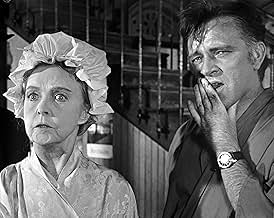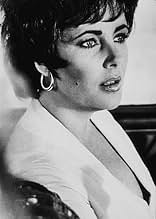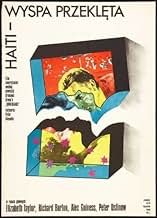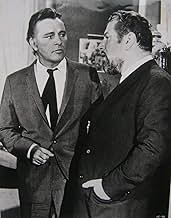VALUTAZIONE IMDb
6,2/10
2396
LA TUA VALUTAZIONE
Aggiungi una trama nella tua linguaA cynical Welsh hotel owner secretly romances a diplomat's wife in Haiti, under the violent reign of the despot "Papa Doc" Duvalier.A cynical Welsh hotel owner secretly romances a diplomat's wife in Haiti, under the violent reign of the despot "Papa Doc" Duvalier.A cynical Welsh hotel owner secretly romances a diplomat's wife in Haiti, under the violent reign of the despot "Papa Doc" Duvalier.
- Premi
- 3 vittorie e 1 candidatura in totale
Thomas Baptiste
- Haitian Soldier
- (non citato nei titoli originali)
Make Bray
- Haitian Soldier
- (non citato nei titoli originali)
Robin Langford
- Angelito Pineda
- (non citato nei titoli originali)
Dennis Alaba Peters
- César
- (non citato nei titoli originali)
Recensioni in evidenza
Based on the novel by Graham Greene, The Comedians is a look at Haiti that nearly 40 years later remains the same - political unrest, poverty, corruption, and brutality. Set during the time of Papa Doc, the story centers on Richard Burton as the white owner of a hotel left to him by his mother. He is in love with the wife (Elizabeth Taylor) of an ambassador (Peter Ustinov) and has managed to remain apolitical. However, events force him to enter the fray.
The Comedians holds one's interest, although it's on the long side. The cast is remarkable: Burton, Alec Guinness, Peter Ustinov, Taylor, James Earl Jones, Lillian Gish, Georg Stanford Brown, Roscoe Lee Brown, and, in a small role, Cicely Tyson. Taylor is very beautiful, although her accent is all over the place. She sounds French in the beginning, then English, then like Elizabeth Taylor, and then in the middle of the movie, we find out she's German.
Though Burton went the schlock for cash route in his career, he was a wonderful, handsome actor with a remarkable voice. Towards the end of the film, he has a scene with Guinness that is well worth the wait - two great actors in a subdued and remarkable scene.
The Haitian scenery belies what lies underneath. It's a film that is perhaps more timely today than it was in 1967.
The Comedians holds one's interest, although it's on the long side. The cast is remarkable: Burton, Alec Guinness, Peter Ustinov, Taylor, James Earl Jones, Lillian Gish, Georg Stanford Brown, Roscoe Lee Brown, and, in a small role, Cicely Tyson. Taylor is very beautiful, although her accent is all over the place. She sounds French in the beginning, then English, then like Elizabeth Taylor, and then in the middle of the movie, we find out she's German.
Though Burton went the schlock for cash route in his career, he was a wonderful, handsome actor with a remarkable voice. Towards the end of the film, he has a scene with Guinness that is well worth the wait - two great actors in a subdued and remarkable scene.
The Haitian scenery belies what lies underneath. It's a film that is perhaps more timely today than it was in 1967.
Peter Glenville's "The Comedians" is a very difficult film for the average viewer. Based on a Graham Greene novel, it's about the political atmosphere in Haiti while under French rule. It was a box office flop in 1967 and is pretty much forgotten today.
That's sad, because this is an important film. Since the departure of Duvalier, the film has the added historical value it didn't have in 1967. It is another entry in the canon of Taylor-Burton collaborations. It also may be the only film in which Alec Guinness, Peter Ustinov, Elizabeth Taylor and Richard Burton all appear in together. Plus, how can you trash a film that flaunts its' Haiti exteriors so joyfully?
The vast Panavision photography will be lost on TV screens, especially in the horrific pan and scan format. The best way to see this film is on a big screen and even that may be impossible these days. The title will confuse many (most will think it's about comedians in a comedy club), but it does have a hidden subtext: these people are "comedians" in a sense. They kid each other endlessly to avoid reality. In that context, "The Comedians" succeeds. It could benefit from some trimming, but that's a small complaint. I can't think of anyone else who would even attempt to make such a challenging film in such a chaotic climate.
***1/2 out of 4 stars
That's sad, because this is an important film. Since the departure of Duvalier, the film has the added historical value it didn't have in 1967. It is another entry in the canon of Taylor-Burton collaborations. It also may be the only film in which Alec Guinness, Peter Ustinov, Elizabeth Taylor and Richard Burton all appear in together. Plus, how can you trash a film that flaunts its' Haiti exteriors so joyfully?
The vast Panavision photography will be lost on TV screens, especially in the horrific pan and scan format. The best way to see this film is on a big screen and even that may be impossible these days. The title will confuse many (most will think it's about comedians in a comedy club), but it does have a hidden subtext: these people are "comedians" in a sense. They kid each other endlessly to avoid reality. In that context, "The Comedians" succeeds. It could benefit from some trimming, but that's a small complaint. I can't think of anyone else who would even attempt to make such a challenging film in such a chaotic climate.
***1/2 out of 4 stars
I saw this movie many years ago and it left me cold. When it came up again on cable, the combination of the stellar cast - Alec Guinness, Richard Burton, Peter Ustinov, Peter Ford, Lillian Gish, James Earl Jones, Liz Taylor - and a script based on a Graham Greene novel, prompted me to give it a second look. Maybe because I'm a lot older now I can appreciate its many qualities. Graham Greene's cynical, post-Catholic sensibility is clearly in evidence here. The production qualities are high, and the story line is engaging. The portrayal of the misery of Haiti and the terror of the Duvalier government with its tontons macoutes secret police, is chilling. It is still true today that if you look up "Third World Hell Hole" in your Funk & Wagnalls, there will be a picture of Haiti. The characters are well-drawn. Burton's character, Brown - who seems to be missing a first name - is a sardonic, cynical and jaded hotel owner who puts one in mind of Rick in Casablanca. His character transformation, involving the shedding of his cynicism, is very effectively portrayed. Mr. & Mrs. Smith (Ford / Gish) might have been portrayed to be the slightly silly and naive characters they appear to be, but in the end they demonstrate a touching bravery and idealism. The weak spot here is Elizabeth Taylor's Martha Pineda. Her attempt, as an ambassador's European wife, at an accent is simply ridiculous, ranging from French (sorta), to British, to German (kinda) depending on the scene. In addition, the film makers decided that extra dollops of Rich and Liz's lovemaking scenes would be an added draw; not a good idea, as they slow down the action and force us to endure listening to Taylor. It's a long movie but it keeps us going to its tragic finale.
This had all the making of a first rate political drama. There is an acclaimed novelist whose novel this was adapted from, an exciting premise (British expatriates in Haiti, brutally ruled by the brutal and eccentric "Papa Doc" Duvliar's, get caught up in political oppression and rebellion), an star-studded ensemble cast, and exotic locations. So why does it fall so flat? Part of the problem is that it the film is overlong, lasting for around two and a half hours. The result is a story which moves very slowly with a lot of excess chat. Also, there is too much emphasis on the dreary soap opera love triangle of the three main characters (Richard Burton, Elizabeth Taylor, and Peter Ustinov). The Burton character, a cynical hotel owner of British decent, is obviously copied on the Humphrey Bogard character in "Cassablanca." The film also fails to take advantage of the official oppression and corruption which is the cause of the country's problems. There is little sense of danger until the last half hour, and even then the action is sporadic. There is also a failure to take advantage of the locations. The film was shot in Benin, an African country which isn't a convincing substitute for Haiti, though there was obviously no way this could have been shot in Haiti itself. But the photography is pretty ordinary. There are a few good scenes, including a voodoo ceremony and a shootout in a cemetery. Also, some supporting characters are actually rather interesting, helped by fine performances by James Earl Jones as a surgeon who supports the rebels and Raymond St. Jacques as a sinister police commander who tortures and murders people as casually as most people would order a take-out lunch. Unfortunately, but most of the film is a case of missed opportunities. It's passable, but overlong and never worthy of the talent that went into it.
After delighting audiences in director Franco Zeffirelli's 1967 hit adaptation of Shakespeare's THE TAMING OF THE SHREW, the Burtons' popularity with audiences seemed to be on the wane as their next film, Peter Glenville's THE COMEDIANS (1967) became their first full-fledged box office disappointment. There was much publicity surrounding the political thriller as it shot in Africa (masquerading as Haiti) and the fact that Taylor accepted half her usual salary and took second billing behind Burton kept gossips wagging for months (she reportedly only took the part out of fear of being replaced with Sophia Loren). But when the film opened, critics found it slow and talky and audiences simply seemed uninterested. Although the film is never quite as interesting or as suspenseful as it could have been, I dare say that THE COMEDIANS probably plays a great deal better today without the heavy expectations of the time surrounding it.
Graham Greene does a respectable job of paring down his complex novel for the screen, and director Glenville keeps the film moving at a reasonable pace in spite of its lengthy runtime of 150 minutes. The film is always interesting and occasionally gripping, although Greene and Glenville keep the audience at a relative distance which prevents the picture from striking as hard as it could have. Burton is in good form, and Alec Guinness, Paul Ford, and Lillian Gish all turn in top notch support (only Peter Ustinov feels under utilized). Unfortunately, Taylor is dreadfully miscast as a German military wife complete with a woefully unconvincing accent and her ill-fitting presence creates several lulls in the film as the number of scenes between her character and Burton's character are increased (in order to give the diva her proper screen time) which hampers a few long stretches of the film and slightly undermines what could have been a first-rate effort.
Graham Greene does a respectable job of paring down his complex novel for the screen, and director Glenville keeps the film moving at a reasonable pace in spite of its lengthy runtime of 150 minutes. The film is always interesting and occasionally gripping, although Greene and Glenville keep the audience at a relative distance which prevents the picture from striking as hard as it could have. Burton is in good form, and Alec Guinness, Paul Ford, and Lillian Gish all turn in top notch support (only Peter Ustinov feels under utilized). Unfortunately, Taylor is dreadfully miscast as a German military wife complete with a woefully unconvincing accent and her ill-fitting presence creates several lulls in the film as the number of scenes between her character and Burton's character are increased (in order to give the diva her proper screen time) which hampers a few long stretches of the film and slightly undermines what could have been a first-rate effort.
Lo sapevi?
- QuizSeveral critics noted that the ending of this movie is at least a little more positive and optimistic than the bleak ending of Graham Greene's original novel, and attacked the movie for "softening" the subject. Graham Greene, however, insisted that the more upbeat ending had been his own idea.
- BlooperIn the last few shots in the movie, as the Character is leaving the airport, there is initially a departing Vickers VC10 airliner flying overhead from right to left, this changes to a close up, followed by a shot of the same airliner now flying into the distance - unfortunately this is different 4 engine Jetliner, probably a Boeing 707.
- Citazioni
Brown: I don't believe in causes.
Dr. Magiot: The role of cynic doesn't really suit you, Brown.
Brown: I don't believe in play-acting either.
Dr. Magiot: You imagine because you've lost one faith, you've lost all? You're wrong, Brown. There is always an alternative to the faith we lose.
Brown: I have no faith in faith.
- ConnessioniFeatured in The Comedians in Africa (1967)
I più visti
Accedi per valutare e creare un elenco di titoli salvati per ottenere consigli personalizzati
- How long is The Comedians?Powered by Alexa
Dettagli
Botteghino
- Lordo Stati Uniti e Canada
- 5.200.000 USD
- Tempo di esecuzione2 ore 30 minuti
- Mix di suoni
- Proporzioni
- 2.35 : 1
Contribuisci a questa pagina
Suggerisci una modifica o aggiungi i contenuti mancanti

Divario superiore
By what name was I commedianti (1967) officially released in India in English?
Rispondi


































